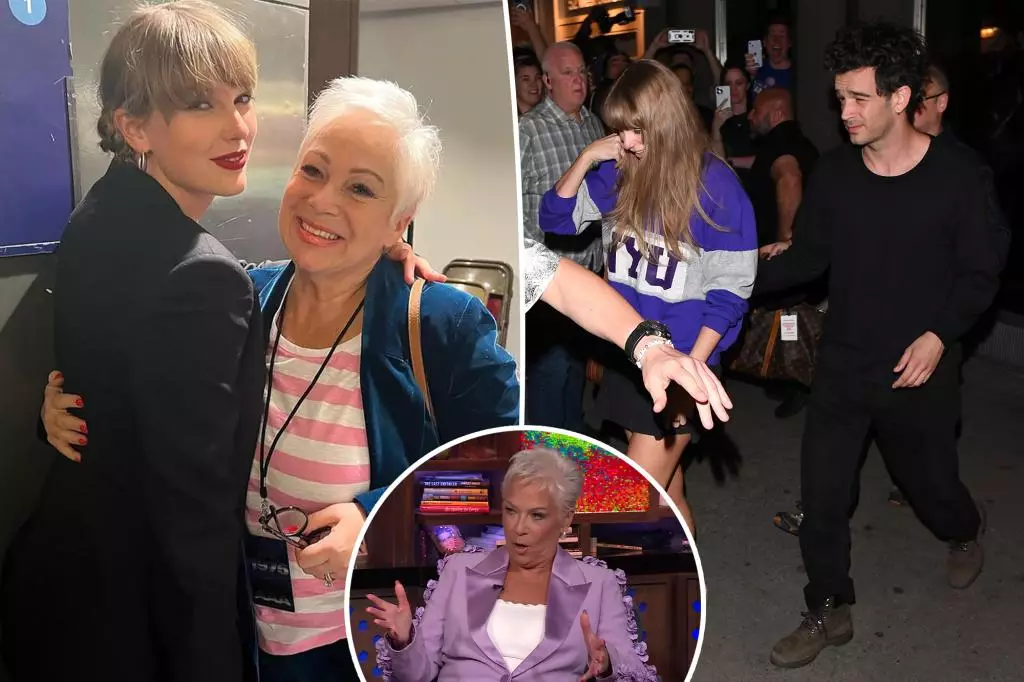In the world of celebrity, personal relationships often transform into public spectacles, exposing intimate details to the scrutinizing eye of fans, media, and the wider world. The recent exchange involving Taylor Swift, Matty Healy, and Denise Welch exemplifies how boundaries can be blurred amid fame’s relentless glare. Welch’s candid remarks about her estranged relationship with Swift serve as a reminder that even in the glittering landscape of pop icons, personal boundaries are fragile and often crossed, whether intentionally or inadvertently.
In her blunt dismissal of the possibility of being related to Swift through marriage, Welch underscores an often-underappreciated truth: the importance of maintaining personal boundaries, especially when outside forces seek to interpret or judge private matters publicly. Her words reveal an underlying discomfort with how such relationships are celebrated or scrutinized, and highlight that celebrity interactions are not just about entertainment but also entail complex human emotions and boundaries that are easily compromised.
The Public’s Appetite for Conflict and the Role of Media
The media’s fascination with celebrity feuds and personal disclosures drives a culture where drama is commodified and controversies become unavoidable. Welch’s pointed comments, laden with subtle dig at Swift, amplified the narrative that celebrity conflicts are spectacles that can fuel public curiosity and engagement. Yet, this raises a critical question: should celebrities and their families be subjected to such invasive scrutiny? The question becomes more urgent when we consider how these disputes influence public perception, often overshadowing the artistic or professional achievements of those involved.
Furthermore, Welch’s remarks, especially her remark about Swift crafting an album inspired by her experiences, illuminate how art becomes a battleground for personal conflicts. Swift’s songwriting, which often draws upon her personal life, turns into a proxy for these disagreements, perpetuating a cycle where personal disputes are masked as artistic expression. This dynamic challenges us to consider whether the line between personal privacy and artistic vulnerability has become dangerously blurred.
The Power of Moving On and Personal Growth
Despite the apparent tensions, Welch emphasizes that she and Healy have moved past their differences, focusing on their current lives and relationships. Her reference to Healy’s engagement and his happiness with his fiancée illustrates a perspective rooted in personal growth. It suggests that holding onto past grievances is unnecessary and that genuine healing involves respecting others’ choices and boundaries.
This attitude invites a broader reflection on the importance of resilience. Celebrity conflicts often appear sensational, but in reality, they mirror everyday struggles with boundaries, forgiveness, and moving forward. Welch’s willingness to publicly acknowledge her discomfort while also signaling her acceptance of change exemplifies a healthy approach: recognizing boundaries, respecting others’ paths, and embracing the evolution that life invariably brings.
Ultimately, the saga surrounding Swift, Welch, and Healy underscores a crucial lesson: in a culture obsessed with spectacle, maintaining respect for personal boundaries and cultivating emotional resilience are more important than ever. As audiences and consumers of celebrity culture, perhaps it’s time we acknowledge the humanity behind the headlines and prioritize empathy over entertainment.

